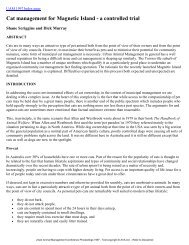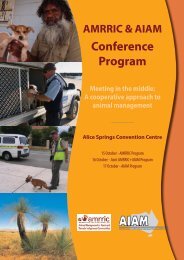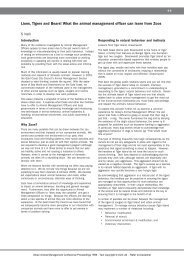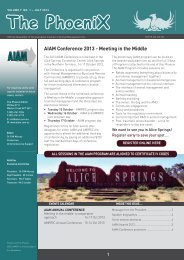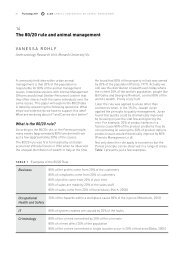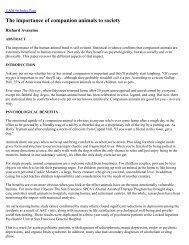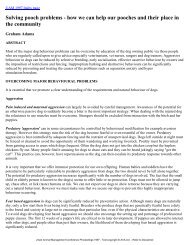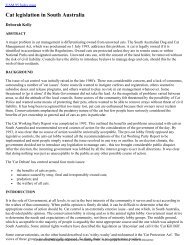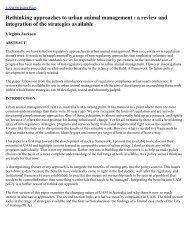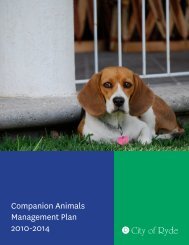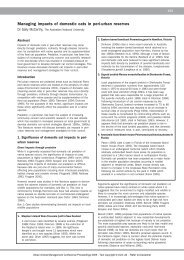Proceedings OF ThE - Australian Institute of Animal Management Inc
Proceedings OF ThE - Australian Institute of Animal Management Inc
Proceedings OF ThE - Australian Institute of Animal Management Inc
Create successful ePaper yourself
Turn your PDF publications into a flip-book with our unique Google optimized e-Paper software.
8 <strong>Proceedings</strong> 2012<br />
AIAM Annual Conference on <strong>Animal</strong> <strong>Management</strong><br />
01<br />
20 years <strong>of</strong> steady progress in animal management – the evolution<br />
<strong>of</strong> an institution<br />
Dick Murray<br />
President AIAM<br />
In 1999, at the 7th National Urban <strong>Animal</strong><br />
<strong>Management</strong> Conference at the Gold Coast, a think<br />
tank meeting was convened to determine what<br />
these conferences should be working towards going<br />
into the new millennium. No one, at that time, had<br />
to be told that something urgently needed to be<br />
done to improve the capacity <strong>of</strong> municipal <strong>Animal</strong><br />
<strong>Management</strong> services to properly meet the needs <strong>of</strong><br />
the <strong>Australian</strong> community. And no one had to be told,<br />
either, that <strong>Animal</strong> <strong>Management</strong> had proven, by that<br />
time, to be a much more complicated subject than<br />
anyone had been previously thought.<br />
At that conference, senior specialist <strong>Animal</strong><br />
<strong>Management</strong> Officers from each State, spoke to<br />
delegates about the (considerable) obstacles they<br />
faced in trying to properly execute their duties. There<br />
was remarkable uniformity <strong>of</strong> opinion on what most<br />
needed to be done. Consensus was quickly reached<br />
on “tagging” the five most pressing needs. These<br />
were all considered equally important and were<br />
listed as follows:<br />
1. Promote recognition in the community <strong>of</strong> the<br />
importance <strong>of</strong> municipal <strong>Animal</strong> <strong>Management</strong><br />
services and the value <strong>of</strong> <strong>Animal</strong> <strong>Management</strong><br />
Officers (AMO) commitment to this;<br />
2. Advocate career pathing through <strong>Animal</strong><br />
<strong>Management</strong> training to Certificate IV level under<br />
the National <strong>Australian</strong> Qualification Framework<br />
standard;<br />
3. Encourage consistency in legislation and<br />
compliance processes across Local and State<br />
Government boundaries in Australia;<br />
4. Support the provision <strong>of</strong> sufficient resources<br />
to allow delivery <strong>of</strong> good quality <strong>Animal</strong><br />
<strong>Management</strong> services; and<br />
5. Hold an annual national forum for the sharing <strong>of</strong><br />
progressive and innovative <strong>Animal</strong> <strong>Management</strong><br />
ideas.<br />
Subsequent to that conference and meeting in 1999,<br />
after the <strong>Australian</strong> <strong>Institute</strong> <strong>of</strong> <strong>Animal</strong> <strong>Management</strong><br />
(AIAM) had been formed, in 2006 AIAM developed a<br />
“Statement <strong>of</strong> Purposes” that aligned the <strong>Institute</strong>’s<br />
corporate identity with its role in endeavouring to<br />
meet these needs. There has been much water under<br />
the bridge since 1992 when the first Urban <strong>Animal</strong><br />
<strong>Management</strong> conference was convened in Brisbane<br />
and much has been achieved.<br />
Introduction<br />
From the outset, there has always a clear<br />
understanding <strong>of</strong> AIAM objectives, which is to<br />
ensure the continued delivery <strong>of</strong> annual national<br />
<strong>Animal</strong> <strong>Management</strong> conferences. There has also<br />
been a clear understanding <strong>of</strong> the reason for doing<br />
this, which is to promote best practices in <strong>Animal</strong><br />
<strong>Management</strong> service delivery by Local Government<br />
in Australia. While in the beginning this was thought<br />
to be the entire story, it was in retrospect, only a<br />
statement <strong>of</strong> <strong>Institute</strong> strategy. It was not a complete<br />
statement <strong>of</strong> <strong>Institute</strong> identity and purpose.<br />
When subsequently, a mission statement, a values<br />
statement and a vision statement were shaped to go<br />
with the strategy statement outlined above, a more<br />
technically correct account <strong>of</strong> the AIAM identity and<br />
purpose subsequently emerged.<br />
AIAM identity and purpose<br />
The key components involved in defining an<br />
organisations corporate identity routinely include<br />
understanding its vision, its mission, its values and<br />
its strategies. For AIAM this can be stated as follows.<br />
> > AIAM’s vision The goal <strong>of</strong> AIAM <strong>Inc</strong>. is to eventually<br />
see an <strong>Animal</strong> <strong>Management</strong> environment across<br />
Australia in local Government that is sufficiently<br />
resourced to shape a nation remarkable for<br />
being one <strong>of</strong> the most sensible, responsible<br />
and considerate in the world when it comes to<br />
municipal animal ownership. In other words,<br />
to have an <strong>Australian</strong> community in which<br />
companion animals have been harmoniously<br />
integrated.<br />
> > AIAM’s mission The mission <strong>of</strong> AIAM <strong>Inc</strong>. is to<br />
provide a mechanism for the effective promotion<br />
<strong>of</strong> such harmonious integration through an<br />
<strong>Animal</strong> <strong>Management</strong> service environment that<br />
has the following five basic operational goals:



